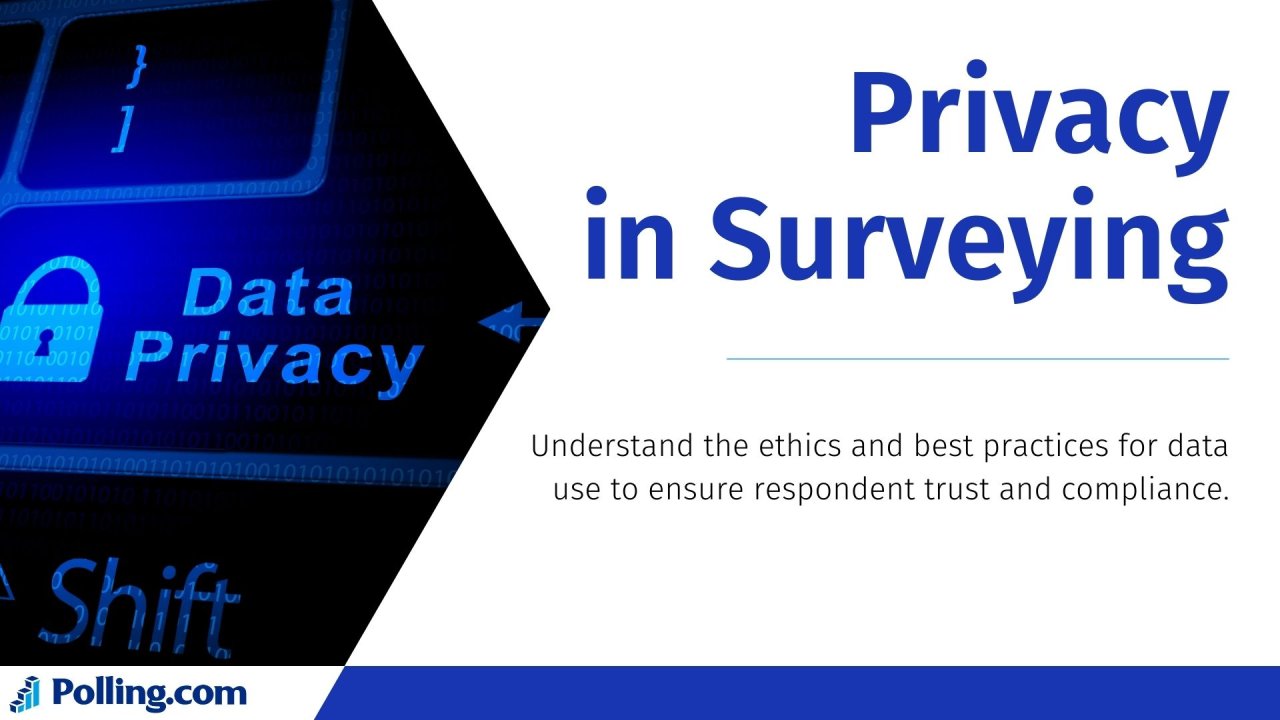
Privacy in Surveying: Ethics and Data Use
Survey tools are useful ways that many businesses use to gather insights, feedback, and data from valued customers and individuals.
While this method is not hard to proceed with, it requires the conductors to follow strictly ethical standards. This means focusing on how to collect data in a way that respects the personal information of participants.
Why is data ethics so important in this context?
We’re living in a world where data is impactful and can be used to make important decisions. If we, unfortunately, reveal data to malicious parties, we can’t even imagine how it can be misused in harmful ways.
By following ethical guidelines in surveying, we can ensure data is trustworthy and protect the respondents who share their information with us.
Understanding Privacy in Surveying
Privacy in surveying means keeping people’s personal information safe and not sharing it without permission.
Online surveys often collect information from individuals in various aspects, such as name, age, email address, phone number, or even sensitive information such as financial information.
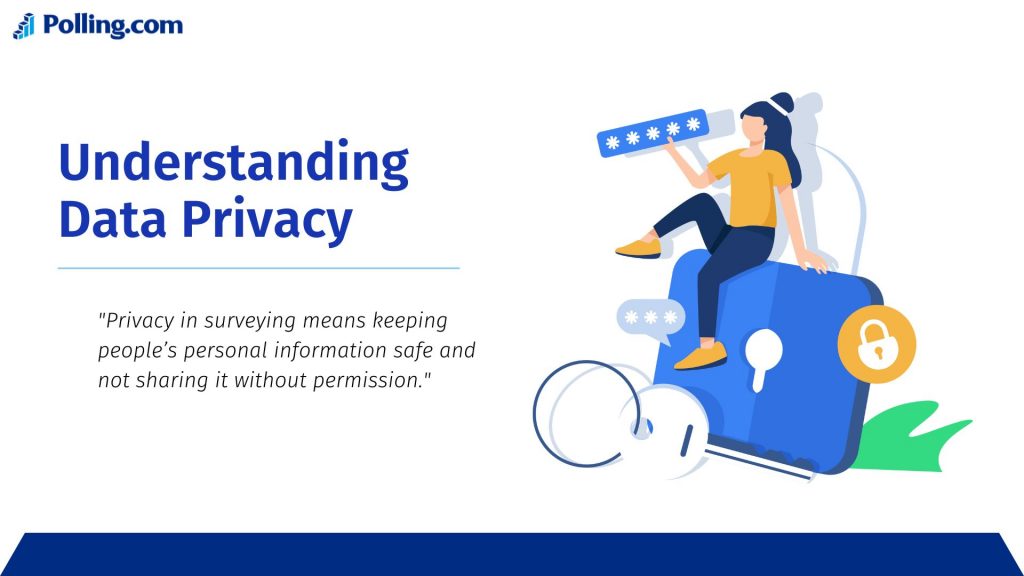
There are various concerns and risks that might bother respondents, but here are the most common:
- Data Breaches: Sometimes, hackers can access survey platforms and steal information, potentially leading to identity theft or financial loss of users.
- Misuse of Personal Information: There is a concern that customer data might be used in ways they didn’t agree to, such as being sold to other companies or used for targeted advertising, which can invade their privacy.
- Lack of Transparency: Participants may worry that their survey data could be used for purposes they are not aware of or didn’t consent to, leading to a lack of trust in how their information is handled.
By participating in surveys and providing this information, respondents have the possibility that their personal details may be exposed somewhere in publicity.
This is exactly where their privacy is violated and can lead to various concerns and risks.
Ethical Data Use in Surveying
When we collect data through polling questions or feedback forms, it’s necessary to handle it with care. This means being honest, responsible, and respectful to everyone involved.
In other words, ensuring the ethical data use in surveying is the top priority.
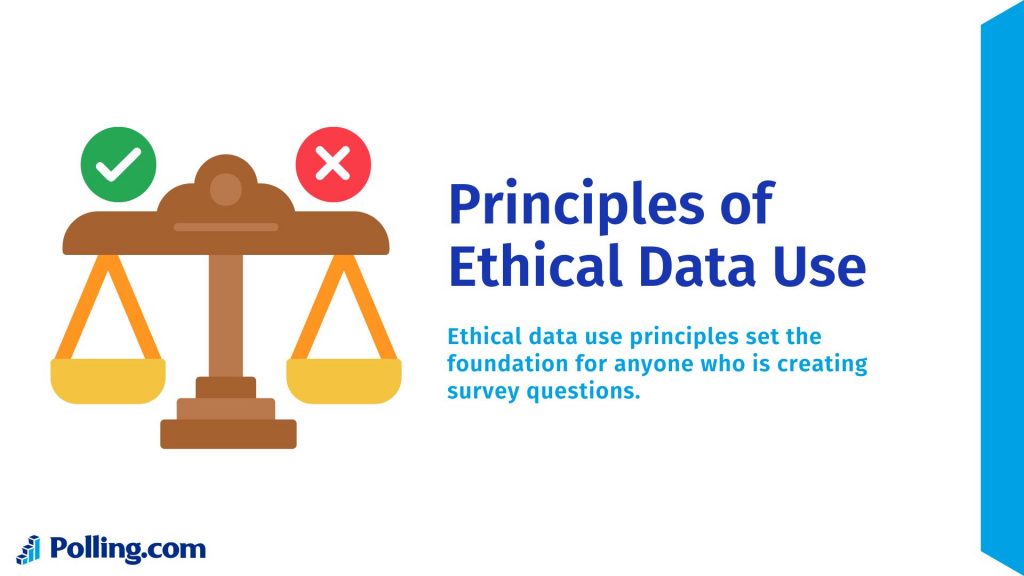
If researchers want to conduct a survey in the right way and ensure the best practices of ethics, it’s essential to follow key principles and perform best practices to manage data.
Principles of Ethical Data Use
Ethical data use principles set the foundation for anyone who is creating survey questions.
By following these guidelines, conductors can make sure that they are collecting data in a way that respects participants.
Here are key principles:
1. Transparency
When joining in all types of survey topics, participants should always be informed about the purpose of the survey, how their data will be used, and who will access it.
The more straightforward and clear this information is, the more trust will be built between conductors and participants.
Additionally, by being fully aware of the data handling processes, participants can make an informed decision about whether or not to take part in the survey.
In other words, this transparency respects the participants’ rights, allowing them to make choices at the start while also enhancing the credibility of those who conduct the survey.
2. Accountability
After collecting survey responses, businesses must take responsibility for protecting the data they collect. Or else, they have to deal with serious situations such as data misuse or data handling incorrectly.
In this case, policies and procedures are vital as they set the rules for the system. Businesses can start by setting clear rules about who can access the data, how it can be used, and how long it will be kept.
Following that, regular audits are also important to make sure everything is on the right track and data is handled responsibly.
For example, businesses should review who has access to the data, how it is being used, and whether it is being stored securely or not.
3. Consent
It is important to get clear permission from participants before collecting any data from the respondents.
In other words, people who participate in surveys have to be first informed about:
- Why the survey is being done
- How their data will be used
- Any possible risks or benefits before taking part
- What will happen to their data after the survey
This can be done through a consent form or an introductory section of the survey.
For very simple surveys or quick polls where no sensitive information is shared, detailed consent may not be necessary. But for more detailed surveys, getting clear consent is very important to respect participants’ rights.
4. Confidentiality
When collecting feedback or opinions from customers, survey conductors need to provide a safe environment for people to feel free to express their opinions in a comfortable way.
This means keeping participants’s personal information private and secure.
At the same time, when customers share their data, businesses need to make sure they trust that their data will be protected from unauthorized access or misuse.
Best Practices for Data Management
Effective data management is key to maintaining survey ethics in data collection.
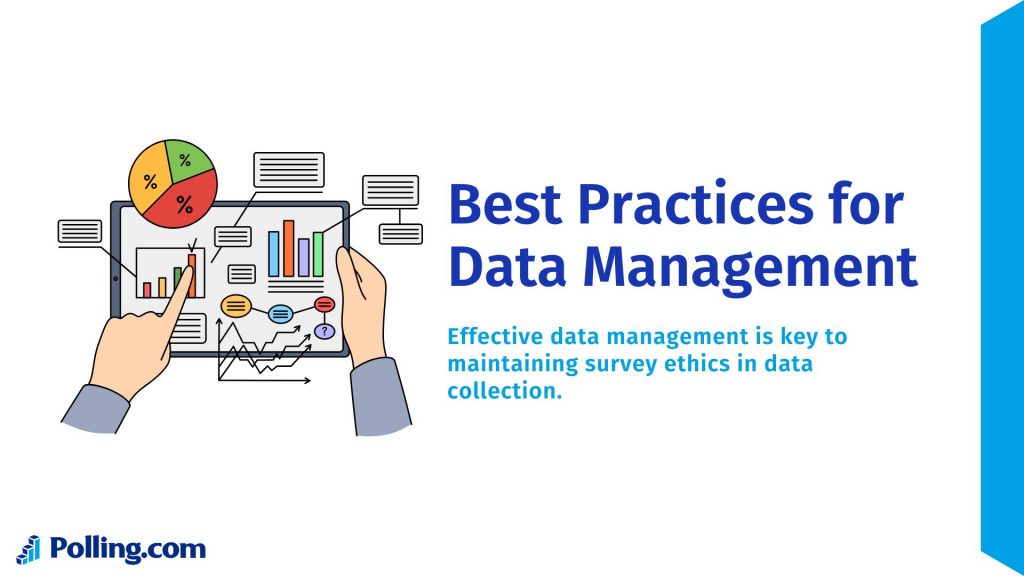
Here are some best practices for securely managing and storing survey data:
1. Secure Data Storage
Data should be stored on secure servers with access limited to authorized personnel only.
It’s important for businesses to use strong passwords and multi-factor authentication to enhance security.
Additionally, regular security audits and updates should also be conducted to prevent potential exposures.
2. Data Minimization
It is important to collect only the data that is necessary for the specific objectives of the survey.
In other words, businesses should avoid collecting excessive or irrelevant data as it increases the risk and complexity of managing it.
By practicing these data minimizations, businesses can reduce the likelihood of misuse and focus particularly on the research goals.
3. Regular Data Review and Deletion
Regularly reviewing the data collection and securely deleting any information that is no longer required for research purposes is a must for maintaining security, data privacy, and ethics.
This limits the risk of data breaches and ensures compliance with data protection regulations.
Legal Frameworks Governing Survey Data
Understanding and following the laws that control how survey data is used is especially important.
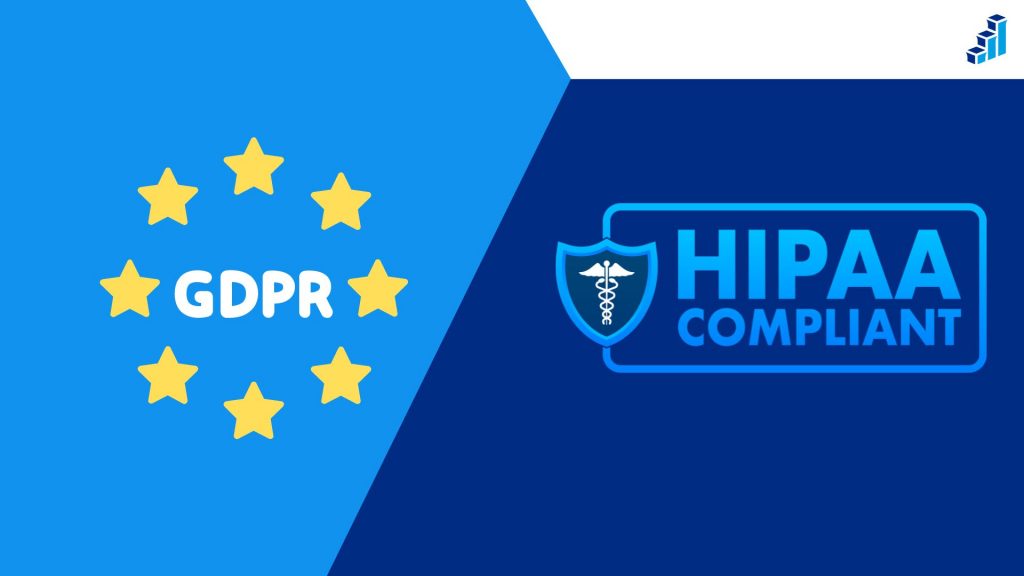
Overview of Relevant Laws
Here’s a quick overview of key laws and the common challenges in following them:
General Data Protection Regulation (GDPR) – EU:
The GDPR protects the personal data of people in the EU.
It applies to any company that collects data from EU residents, no matter where the company is located. Key rules include:
- Consent: Getting clear permission from people before collecting their data.
- Data Minimization: Only collecting the data that is necessary for the survey.
- Right to Access: Letting people see the data collected about them and allowing them to ask for corrections or deletions.
- Data Breach Notification: Informing authorities and affected individuals about data breaches within 72 hours.
Health Insurance Portability and Accountability Act (HIPAA) – USA:
HIPAA protects health information in the USA.
It applies to healthcare providers, health plans, and others handling health data. Key rules include:
- Privacy Rule: Keeping health information confidential, such as patient name, address, health condition, etc.
- Security Rule: Using safeguards to protect health data.
- Breach Notification Rule: Informing individuals and authorities about breaches involving health data.
Compliance Challenges
Different places have different rules and regulations, so keeping up with all of them might be confusing.
Furthermore, each law has its own rules so this requires businesses to understand clearly and follow them all.
As a result, companies must invest time and resources to ensure they comply with every relevant law.
While this might be challenging, it is necessary for protecting data and maintaining trust with survey participants.
The Role of Technology in Ethical Surveying
In our ever-changing world, technology is key to maintaining the privacy and security of survey data.
Here are some tools and trends that help ensure ethical practices.
Technological Tools for Ensuring Privacy
Technology plays a vital role in safeguarding the privacy and security of survey data.
- Encryption: Encryption converts data into a code to prevent unauthorized access, ensuring data security.
- Anonymization: Anonymization removes or alters personal identifiers from survey data to protect participant privacy while preserving data utility.
- Secure Data Storage: Secure data storage solutions, such as encrypted cloud services, protect survey data from breaches and unauthorized access.
- Consent Management Tools: These tools track and manage participants’ consent for data collection and use, ensuring transparency and compliance with privacy regulations.
Emerging Trends
There are new technologies that are shaping the future of ethical considerations in research.
- Artificial Intelligence (AI): AI enables quick and accurate analysis of survey data, but ethical considerations are crucial to prevent acquiescence biases and misuse of personal data.
- Big Data Analytics: Big data analytics uncovers valuable insights from large datasets, but organizations must ensure data anonymization to protect privacy.
- Blockchain Technology: Blockchain creates a secure and transparent record of data transactions, enhancing trust and accountability in data handling.
- Privacy-Enhancing Technologies (PETs): PETs, like differential privacy and homomorphic encryption, enable data analysis without compromising individual privacy.
- Internet of Things (IoT): IoT devices capture real-time data for surveys, but organizations must ensure transparent consent mechanisms and data security.
Conclusion
Ethical concerns in research and surveying are crucial in our data-driven world as data can affect various decisions as well as impact people’s lives.
Regarding business in survey practices, it’s necessary to follow data ethics to build trust with participants and ensure reliable data.
Keep in mind the key principles include transparency, accountability, consent, and confidentially. At the same time, we always seek new approaches from technology, such as encryption, anonymization, etc, to enhance data security.
